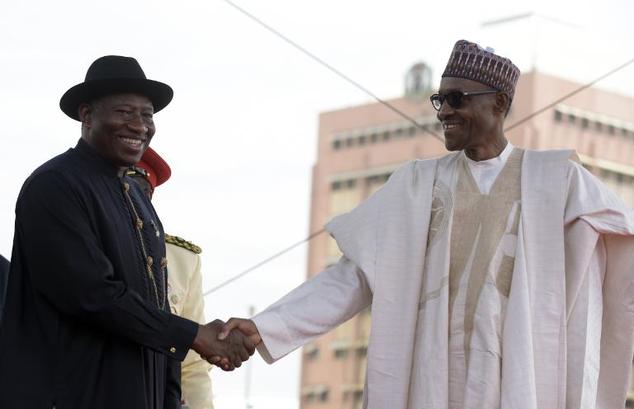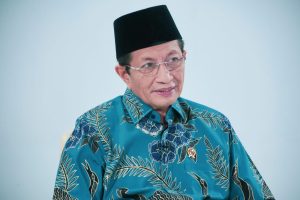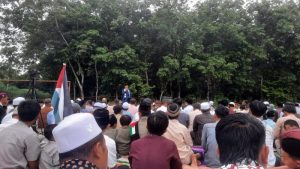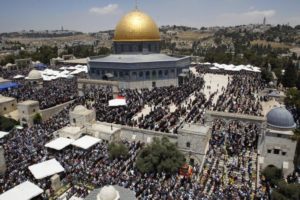Abuja, 13 Sya’ban 1436/31 May 2015 (MINA) – The former military ruler Muhammadu Buahri was sworn in on Friday (29/5), as Nigeria’s new president in a celebratory atmosphere, after his historic win last March.
“We are going to tackle them head on. We must not succumb to hopelessness and defeatism. We can fix our problems,” the new president told crowd, On Islam quoted by Mi’raj Islamic News Agenyc (MINA) as reporting.
“The new government is basking in a reservoir of goodwill and high expectations. We have an opportunity. Let us take it.”
Taking oath in the capital, the new leader, said he belonged to everybody and to nobody and acknowledged the enormous challenges ahead.
Also Read: Pakistan Condemns Israeli Settler Attacks in West Bank, Al-Aqsa Storming
Dressed in flowing white robes, a tradition in Muslim-majority north, Buhari was welcomed by a 21-gun salute rang out across Abuja.
During the inauguration ceremony, the president toured the venue in an open-topped presidential jeep and waved to the crowds.
The new president vowed to tackle major challenges that beset the West African country as he kicked off his four-year term.
Calling Boko Haram “a mindless, godless group who are as far away from Islam as one can think of”, Buhari pledged to end the terrorist group’s insurgency.
Also Read: China Criticizes US-Drafted UN Gaza Resolution as Vague, Abstains from Vote
He also vowed to free Boko Haram hostages including the 219 Chibok school girls abducted in April 2014.
The 2014 mass abduction from Chibok led to an international social media movement, #BringBackOurGirls, to rescue them.
Boko Haram, a Hausa term meaning “Western education is sinful”, is loosely modelled on Afghanistan’s Taliban.
For the last five years, Nigeria has battled a fierce Boko Haram insurgency that has ravaged the country’s volatile northeastern region and claimed thousands of lives.
Also Read: Former Bangladesh PM Sheikh Hasina Sentenced to Death
But 2014 has been the bloodiest year of the insurgency yet, with increasingly frequent attacks, higher death tolls and a deluge of displaced persons.
The militant group has been kidnapping females for years and has hundreds in their custody.
Earlier this year, Boko Haram militants killed around 2,000 people and burned down homes in the northeast Nigerian town of Baga, according to Amnesty International.
High Expectations
Also Read: Pakistan Declares State of War After Car Bomb Incident
In a country struggling with slowing economic growth and raging insurgency, many believe that the new leader’s biggest challenge would be “managing high expectations”.
“People are very happy. Nigerians both inside and outside the country have tremendous expectations from this new government,” businessman Chambers Okorie told AFP.
“We are looking forward to seeing the reality of this change he has professed,” he added, expressing hope Buhari can end decades of religious and ethnic division that have blighted the nation.
Most Nigerians agree he did not use the presidency to enrich himself and his backers. His iron-fisted administration jailed several politicians on graft charges.
Also Read: Jakarta Hosts Gala Dinner for World Peace Forum Delegates
Besides combating insurgency, Buhari also promised to show concern towards unemployment.
Nigeria’s 173 million citizens are relying on their new leader to form a government that could tackle economic and security issues.
“Now it’s time for the heavy lifting,” Bismark Rewane, chief executive of Lagos-based consultancy Financial Derivatives, told Reuters.
“Nigeria is going to be more visible and more assertive.
Also Read: Indonesian Minister Urges Synergy Between Wasathiyah Islam and Chinese Wisdom
“Do you have the team that is respected by the international community, that has the pedigree and the background to deal with the management issues?”
The 72-year-old president was declared as the new Nigerian president after a closely fought election last March, becoming the first Nigerian to oust a president through the ballot box.
Nigeria, one of the world’s most religiously committed nations, is divided between a Muslim north and a Christian south.
Muslims and Christians, who constitute 55-40 percent of Nigeria’s 140 million population, live in peace for the most part. (T/P006/R03)
Also Read: New Delhi Covered in Toxic Smog: Residents Say ‘We Can Hardly Breathe’
Mi’raj Islamic News Agency (MINA)
Also Read: Boat Carrying 100 Rohingya Migrants Capsizes in Malaysian Waters











![Israeli tanks and APC’s gather by the Israeli – Lebanese border. Amid Israel’s escalating campaign against Hezbollah in Lebanon on September 30, 2024. [Erik Marmor/Getty Images]](https://en.minanews.net/wp-content/uploads/2024/10/IMG_20241001_203226-300x197.jpg)






















 Mina Indonesia
Mina Indonesia Mina Arabic
Mina Arabic